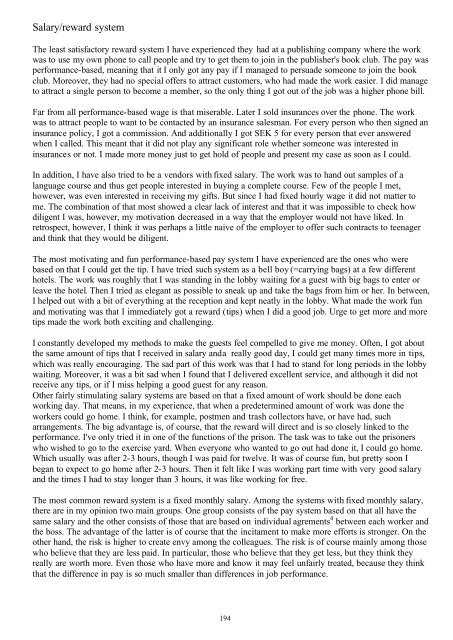Life – a user's manual Part II - Boksidan
Life – a user's manual Part II - Boksidan
Life – a user's manual Part II - Boksidan
You also want an ePaper? Increase the reach of your titles
YUMPU automatically turns print PDFs into web optimized ePapers that Google loves.
Salary/reward system<br />
The least satisfactory reward system I have experienced they had at a publishing company where the work<br />
was to use my own phone to call people and try to get them to join in the publisher's book club. The pay was<br />
performance-based, meaning that it I only got any pay if I managed to persuade someone to join the book<br />
club. Moreover, they had no special offers to attract customers, who had made the work easier. I did manage<br />
to attract a single person to become a member, so the only thing I got out of the job was a higher phone bill.<br />
Far from all performance-based wage is that miserable. Later I sold insurances over the phone. The work<br />
was to attract people to want to be contacted by an insurance salesman. For every person who then signed an<br />
insurance policy, I got a commission. And additionally I got SEK 5 for every person that ever answered<br />
when I called. This meant that it did not play any significant role whether someone was interested in<br />
insurances or not. I made more money just to get hold of people and present my case as soon as I could.<br />
In addition, I have also tried to be a vendors with fixed salary. The work was to hand out samples of a<br />
language course and thus get people interested in buying a complete course. Few of the people I met,<br />
however, was even interested in receiving my gifts. But since I had fixed hourly wage it did not matter to<br />
me. The combination of that most showed a clear lack of interest and that it was impossible to check how<br />
diligent I was, however, my motivation decreased in a way that the employer would not have liked. In<br />
retrospect, however, I think it was perhaps a little naive of the employer to offer such contracts to teenager<br />
and think that they would be diligent.<br />
The most motivating and fun performance-based pay system I have experienced are the ones who were<br />
based on that I could get the tip. I have tried such system as a bell boy (=carrying bags) at a few different<br />
hotels. The work was roughly that I was standing in the lobby waiting for a guest with big bags to enter or<br />
leave the hotel. Then I tried as elegant as possible to sneak up and take the bags from him or her. In between,<br />
I helped out with a bit of everything at the reception and kept neatly in the lobby. What made the work fun<br />
and motivating was that I immediately got a reward (tips) when I did a good job. Urge to get more and more<br />
tips made the work both exciting and challenging.<br />
I constantly developed my methods to make the guests feel compelled to give me money. Often, I got about<br />
the same amount of tips that I received in salary anda really good day, I could get many times more in tips,<br />
which was really encouraging. The sad part of this work was that I had to stand for long periods in the lobby<br />
waiting. Moreover, it was a bit sad when I found that I delivered excellent service, and although it did not<br />
receive any tips, or if I miss helping a good guest for any reason.<br />
Other fairly stimulating salary systems are based on that a fixed amount of work should be done each<br />
working day. That means, in my experience, that when a predetermined amount of work was done the<br />
workers could go home. I think, for example, postmen and trash collectors have, or have had, such<br />
arrangements. The big advantage is, of course, that the reward will direct and is so closely linked to the<br />
performance. I've only tried it in one of the functions of the prison. The task was to take out the prisoners<br />
who wished to go to the exercise yard. When everyone who wanted to go out had done it, I could go home.<br />
Which usually was after 2-3 hours, though I was paid for twelve. It was of course fun, but pretty soon I<br />
began to expect to go home after 2-3 hours. Then it felt like I was working part time with very good salary<br />
and the times I had to stay longer than 3 hours, it was like working for free.<br />
The most common reward system is a fixed monthly salary. Among the systems with fixed monthly salary,<br />
there are in my opinion two main groups. One group consists of the pay system based on that all have the<br />
same salary and the other consists of those that are based on individual agrements 4 between each worker and<br />
the boss. The advantage of the latter is of course that the incitament to make more efforts is stronger. On the<br />
other hand, the risk is higher to create envy among the colleagues. The risk is of course mainly among those<br />
who believe that they are less paid. In particular, those who believe that they get less, but they think they<br />
really are worth more. Even those who have more and know it may feel unfairly treated, because they think<br />
that the difference in pay is so much smaller than differences in job performance.<br />
194
















